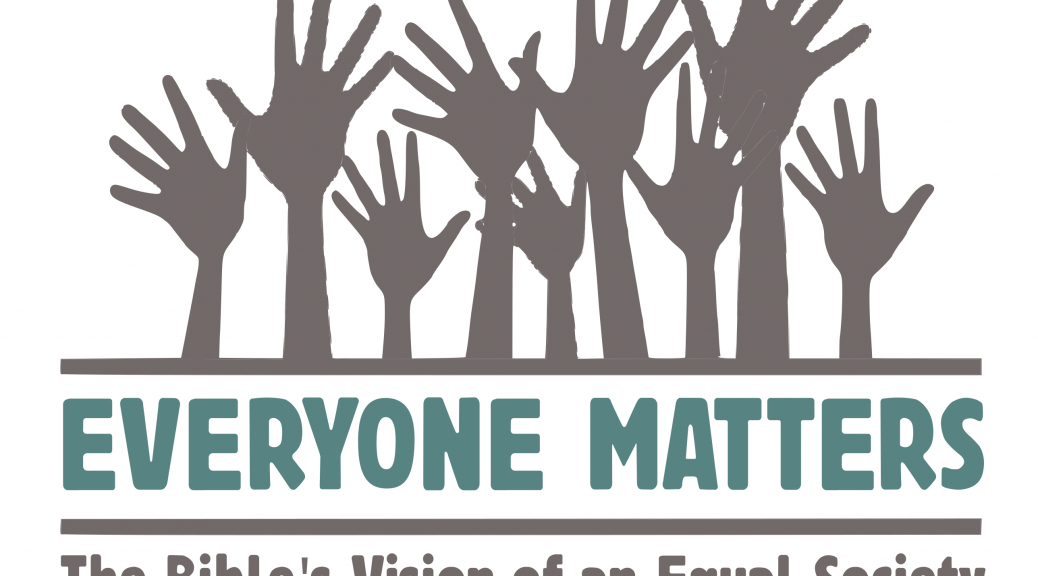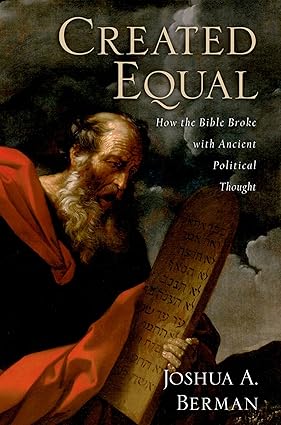
Class Description and Resource Page: “Everyone Matters: The Bible’s Vision an Equal Society”

A major source of human suffering is the way societies tend to let a small group rise above the rest and hold power over them. Throughout history, there have always been elites and commoners. While every group needs leaders, too often leadership turns into tyranny, and the masses end up serving the leader’s desires.
We’ve all seen this in action. Certain kids at school become popular, leaving others feeling unpopular or inferior. This ranking continues into adulthood as wealth and fame concentrate in the hands of a few. Unfortunately, the majority struggle in the shadows. Even in religious communities, some leaders receive praise while regular members do the work and cover the costs.
Saying “everyone matters” or “all people are created equal” might seem obvious. But finding a society that hasn’t organized itself by class or status is rare. In fact, the ancient world accepted it as natural for elites to dominate and commoners to serve.
What Does the Bible Say?
Ancient Israel, however, was different. A close reading of its oldest texts, especially the first five books of the Bible, reveals a unique perspective. Unlike surrounding societies, Israel’s tradition challenges the accepted social hierarchies of the ancient world. It suggests that dividing humanity by class, race, wealth, or education is not God’s will.
The Bible challenges this ranking of people and invites us to live in a way where everyone matters. It says that we need to lift those at the bottom. Those at the top need to share their power.
It’s understandable to think that treating everyone equally is a nice lesson for kids but unrealistic in the adult world. You might even think the topic is uninteresting. But look at the themes of the current election: the marginalization of the poor, the concentration of wealth among the elite, the power of leaders, the role of men in families, who belongs and who leads the country, whose voice counts, and more.
These are all questions about dominance and the pain of being low on the totem pole.
You might think, “Haven’t we heard this before?” But the answer may surprise you: we haven’t.
Ancient Israel Was Different
The reason we can now hear this egalitarian message from the Bible is that scholars have learned much more about the ancient societies surrounding Israel. It turns out that the biblical worldview broke with other ancient beliefs. The Bible, especially the first five books lifted common people and limited the power of elites.
The class “Everyone Matters” will explore a universal value first seen in Israel’s ancient faith and carried through both the Old and New Testaments: every human being is precious and important in God’s plan.
The theme of equality isn’t found in a single verse or story but is inferred from a broad reading of many books in the Bible. For example, while most ancient societies expected the masses to serve their kings and religious leaders and give their toil to them, the Bible takes a different approach. In Genesis, God creates humans as partners in creation, giving them responsibility over nature and animals. From the start, the Bible portrays humanity as having a royal essence.
Recent scholarship has shown that Israel did not share the values of its neighboring kingdoms. Israel believed that God had called it to improve the lives of all nations. Because of this egalitarian principle, ancient Israel was the first society to value the welfare of common people, the poor, the displaced, foreigners, and women.
Israel’s laws also limited the traditional powers of kings. The Hebrew Bible prevents military generals, religious leaders, the wealthy, and the educated from consolidating power. Some scholars have begun referring to Israel as a constitutional society. Much of this value system was rediscovered during the 17th and 18th centuries in the writings of political philosophers who influenced the founding of America.
So, how does the Bible support the principle that everyone matters? Here are five values we will explore in the class.
The Class
Date |
Time |
Room |
Title |
Description |
Additional Materials |
| 1-Sep-24 | 10:00 a.m. | 203 | “Introduction: Everyone Matters” | The Old Testament laws aimed to uphold the dignity of all individuals, including the poor, foreigners, and criminals, challenging the hierarchical norms of ancient societies. | First Class Video, handout sheet |
| 8-Sep-24 | 10:00 a.m. | 203 | “Economics: Down and Out in the Ancient World” | The Bible breaks with other ancient religions by urging Israel to eliminate traditional practices of lending and slavery which led common people into poverty | |
| 15-Sep-24 | 10:00 a.m. | 203 | “The Road to Literacy” | Unlike other ancient societies where literacy was restricted to the elite, the Old Testament advocates for widespread access to reading and important ideas. | |
| 22-Sep-24 | 10:00 a.m. | 203 | “Politics: No More Dictators” | Ancient Israel was unique in limiting the power of its kings over religion and the military, promoting a more balanced distribution of authority. | Fourth Class Video, handout sheet |
| 29-Sep-24 | 10:00 a.m. | 203 | “Open Discusion” | Ancient Israel was unique in limiting the power of its kings over religion and the military, promoting a more balanced distribution of authority. | Fifth Class Video, |
The class’s content and conclusions are based on Joshua Berman’s book, Created Equal: How the Bible Broke with Ancient Political Thought (Oxford University Press, 2008).

Statement for Class Discussion
This class’s basic idea is that God and Israel have woven the principle of social egalitarianism into the Hebrew Scriptures. What the Bible is “about” is the deliverance of people from an arrangement were the elites keep themselves high above the people, extracting whatever they can get.
At the heart of the Old Testament is the story of the Hebrew people’s escape from slavery in Egypt. The Exodus represents not just an event but a core principle that illuminates the Scriptures, the significance of the Christ event, and the essence of faith. The theme that “everyone matters” is present throughout both testaments, often explicitly, but always central to the Bible’s main messages.
We’ve looked at four structural characteristics of the Old Testament. These points underscore a fundamental biblical value, namely that God’s plan is to elevate the common people and disempower the elites.
- Economic Safeguards against Poverty. The Jubilee provisions laid out in Leviticus 17, when implemented would make permanent poverty impossible.
- The democratization of knowledge through the development of alphabetical language, the need for everyone to participate in community life, and the introduction of universal primary education.
- The Disempowerment of the King through a law code that anticipates the Constitution of the United States.
- A theological anthropology, which sees humans as co-creators and co-overseers with God over creation. People are destined to reign in love with God.
What we can say is that the Bible does not only provide religious information about God’s nature and our calling to a spiritual life. Just as importantly, the Bible is about the ordering of society.
Dare we say it—the Bible is a about politics.
It’s about how human groups are set up. It’s about what God does when the pharaohs, emperors, Caesars, strong men, or presidents are lording it over everyone else.
The Bible shines a light for us as we cast our vote, run our businesses, or volunteer in clubs or church. In every sphere, if the weaker, poorer, disliked, and outsider is lifted up and the top guy’s power is checked, then we’ve aligned ourselves with what God is working to make happen in the world.
